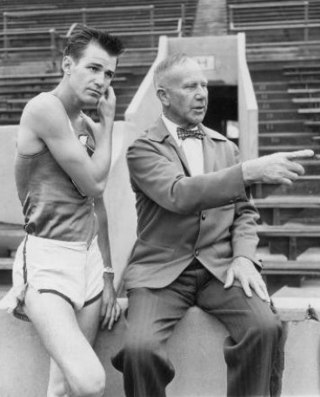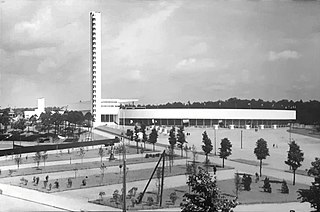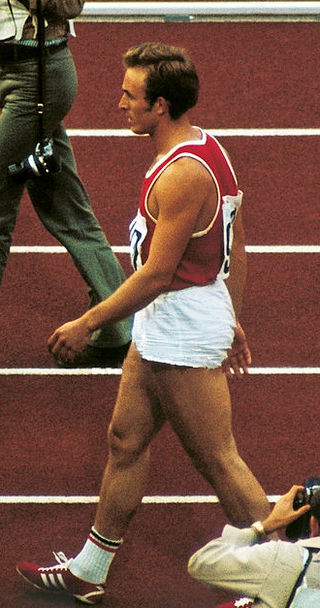
The men's 200 metres at the 2000 Summer Olympics, as part of the athletics programme, was held at Stadium Australia on Wednesday 27 September and Thursday 28 September 2000. There were 67 competitors from 50 nations. The event was won by Konstantinos Kenteris of Greece, the nation's first medal in the event. Darren Campbell's silver was Great Britain's first men's 200 metres medal since 1980 and matched the nation's best result in the event. Ato Boldon of Trinidad and Tobago repeated as bronze medalist, the ninth man to earn multiple medals in the 200 metres.

The men's 200 metres was the second-shortest of the men's track races in the Athletics at the 1964 Summer Olympics program in Tokyo. 63 athletes from 48 nations entered, with 6 not starting in the first round. The maximum number of athletes per nation had been set at 3 since the 1930 Olympic Congress. The first two rounds were held on 16 October, with the semifinals and the final on 17 October. The event was won by 0.2 seconds by Henry Carr of the United States, the nation's 11th victory in the event. Fellow American Paul Drayton took silver; it was the fifth time in six Games that the United States had the top two finishers. Edwin Roberts gave Trinidad and Tobago its first medal in the men's 200 metres with his bronze.
The men's 400 metres was the third-shortest of the men's track races in the Athletics at the 1964 Summer Olympics program in Tokyo. It was held on 17 October, 18 October, and 19 October 1964. 55 athletes from 36 nations entered, with 5 not starting in the first round. The first two rounds were held on 17 October, with the semifinals on 18 October and the final on 19 October. The maximum number of athletes per nation had been set at 3 since the 1930 Olympic Congress. The event was won by 0.1 seconds by Mike Larrabee of the United States, the third consecutive and tenth overall victory for an American in the event. Trinidad and Tobago and Poland each earned their first medal in the 400 metres.

The men's 400 metres hurdles was the longer of the men's hurdle races in the Athletics at the 1964 Summer Olympics program in Tokyo. It was held on 14 October, 15 October, and 16 October 1964. 39 athletes from 26 nations competed, with 1 more not starting in the first round. The maximum number of athletes per nation had been set at 3 since the 1930 Olympic Congress. The first round was held on 14 October, with the semifinals on 15 October and the final on 16 October. The event was won by Rex Cawley of the United States, the nation's sixth consecutive and 11th overall victory in the men's 400 metres hurdles. For the first time since 1952, the Americans did not sweep the event. John Cooper earned Great Britain's first medal in the event since 1928 with his silver; Salvatore Morale took Italy's first-ever medal in the 400 metres hurdles with his bronze.

The men's 200 metres was an event at the 1956 Summer Olympics in Melbourne. There were 67 competitors from 32 countries. The first and second rounds were held on Monday 26 November and the semifinals and final on Tuesday 27 November. The maximum number of athletes per nation had been set at 3 since the 1930 Olympic Congress.

The men's 200 metres was an event at the 1928 Summer Olympics in Amsterdam. It was held on 31 July and 1 August 1928 at the Olympic Stadium. There were 59 competitors from 29 nations. Nations had been limited to 4 athletes each since 1920. The event was won by 0.1 seconds by Percy Williams of Canada, the nation's second victory in the event. The win broke a streak of three victories by the United States; with no Americans on the podium, the nation's six-Games medal streak was broken as well. Walter Rangeley of Great Britain took silver, giving Great Britain a four-Games medal streak in the event. Germany earned its first men's 200 metres medal with Helmut Körnig's bronze.
The men's 100 metres event was part of the athletics programme at the 1920 Summer Olympics. The competition was held on August 15 and 16, 1920. The event was won by Charley Paddock of the United States. Great Britain won its first medal in the event, a bronze by Harry Edward.
The men's 400 metres event was part of the track and field athletics programme at the 1920 Summer Olympics. The competition was held on Thursday, August 19, 1920, and on Friday, August 20, 1920. 37 runners from 16 nations competed. No nation had more than 4 runners, suggesting the limit had been reduced from the 12 maximum in force in 1908 and 1912. The event was won by Bevil Rudd of South Africa, the nation's first title in the event. Nils Engdahl's bronze was Sweden's first medal in the 400 metres.
The men's 800 metres event was part of the track and field athletics programme at the 1920 Summer Olympics. The competition was held from Sunday, August 15, 1920, to Tuesday, August 17, 1920. Forty runners from 17 nations competed. No nation had more than 4 runners, suggesting the limit had been reduced from the 12 maximum in force in 1908 and 1912. The event was won by Albert Hill of Great Britain, snapping a three-Games streak of American victories and starting a four-Games streak of British wins. Bevil Rudd, the 400 metres winner in 1920, took bronze to give South Africa its first medal in the 800 metres.
The men's 1500 metres event was part of the track and field athletics programme at the 1920 Summer Olympics. The competition was held on Wednesday, August 18, 1920, and on Thursday, August 19, 1920. Twenty-nine runners from 12 nations competed. No nation had more than 4 runners, suggesting the limit had been reduced from the 12 maximum in force in 1908 and 1912. The event was won by Albert Hill of Great Britain, completing his middle-distance double. It was the nation's second consecutive and third overall championship in the men's 1500 metres.

The men's 400 metres hurdles event was part of the track and field athletics programme at the 1920 Summer Olympics. The competition was held on Sunday, August 15, 1920, and on Monday, August 16, 1920. 19 runners from 9 nations competed. Nations were limited to 4 hurdlers each. The event was won by Frank Loomis of the United States, the fourth consecutive victory by an American. The United States secured its second sweep in the event, and first with other nations competing, with John Norton taking silver and August Desch bronze.

The men's 200 metres was an event at the 1992 Summer Olympics in Barcelona, Spain. There were 79 participating athletes from 65 nations, with eleven qualifying heats. The maximum number of athletes per nation had been set at 3 since the 1930 Olympic Congress. The event was won by 0.12 seconds by Michael Marsh of the United States, the nation's third consecutive and 15th overall victory in the event. The Americans would take a second medal for the third consecutive Games as well, this time with Michael Bates earning bronze. The silver medal went to Frankie Fredericks, taking Namibia's first medal in the men's 200 metres.
The men's 100 metres event was part of the track and field athletics programme at the 1924 Summer Olympics. This race was depicted in the film Chariots of Fire. The first two rounds were held on 6 July, with the semifinals and final on 7 July. Eighty-six sprinters from 34 countries competed. The event was won by Harold Abrahams of Great Britain—Great Britain's first Olympic gold medal in the men's 100 metres and only the second time that the United States failed to win. Jackson Scholz kept the Americans on the podium with a silver. Arthur Porritt won the bronze, New Zealand's first medal in the event.

The men's 200 metres event was part of the track and field athletics programme at the 1924 Summer Olympics. The first two rounds were held on 8 July, with the semifinals and final on 9 July. Sixty-five sprinters from 33 countries competed. Nations were limited to 4 athletes each. The event was won by 0.1 seconds by Jackson Scholz of the United States, the nation's third consecutive victory in the event and fifth in six Games. For the third straight Games, the podium consisted of two Americans winning gold and silver and a Briton taking bronze. Paddock, the silver medalist in 1920 as well, was the second man to earn multiple medals in the 200 metres.

The men's 200 metres was held on 2 September and 3 September as part of the athletics at the 1960 Summer Olympics, which were held in Rome. 74 athletes from 54 nations entered, but only 62 athletes from 47 nations ultimately competed. The maximum number of athletes per nation had been set at 3 since the 1930 Olympic Congress. The event was won by 0.1 seconds by Livio Berruti of Italy, the first victory in the event by a nation outside of North America and snapping a five-Games winning streak by the United States. The Americans finished with a silver medal, by Lester Carney, to extend their medal streak to six Games. Abdoulaye Seye of France took bronze. Berruti's gold and Seye's bronze were the first medal for their nations in the men's 200 metres.

The men's 200 metres sprint event at the 1936 Olympic Games took place between August 4 and August 5. There were 44 athletes from 22 nations competing. The maximum number of athletes per nation had been set at 3 since the 1930 Olympic Congress. The final was won by 0.4 seconds by American Jesse Owens, with silver going to Mack Robinson. Owens thus reached 3 gold medals in 1936, with the sprint relay still to come. The Netherlands earned its first medal in the men's 200 metres with Tinus Osendarp's bronze.

The men's 200 metres sprint event at the 1948 Summer Olympics took place between 2 August and 3 August. There were 51 competitors from 28 nations. The maximum number of athletes per nation had been set at 3 since the 1930 Olympic Congress. The final was won by American Mel Patton. His countryman Barney Ewell earned silver, making this the third consecutive Games the United States took the top two spots in the event. Lloyd La Beach's bronze gave Panama a medal in its debut in the event.

The men's 200 metres sprint event at the 1952 Olympic Games took place between July 22 and July 23. There were 71 competitors from 35 nations. The maximum number of athletes per nation had been set at 3 since the 1930 Olympic Congress. The final was won by 0.16 seconds by American Andy Stanfield. Americans also took silver and bronze as the United States swept the medals in the event for the third time.

The men's 400 metres hurdles event at the 1952 Summer Olympics took place July 20–21, 1952 at the Helsinki Olympic Stadium. There were 40 competitors from 24 nations. The maximum number of athletes per nation had been set at 3 since the 1930 Olympic Congress. The final was won by American Charles Moore. It was the nation's third consecutive and eighth overall victory in the event. The Soviet Union, in its debut, and New Zealand each earned their first medal in the men's 400 metres hurdles, with Yuriy Lituyev's silver and John Holland's bronze, respectively.

The men's 200 metres was an event at the 1972 Summer Olympics in Munich. The competition was held on 3–4 September. There were 57 competitors from 42 nations. The maximum number of athletes per nation had been set at 3 since the 1930 Olympic Congress. The event was won by 0.19 seconds by Valeriy Borzov of the Soviet Union, the nation's first medal in the event. Larry Black took silver, extending the United States' podium streak in the men's 200 metres to nine Games. Italy earned its first medal in the event since 1960 with Pietro Mennea's bronze.














